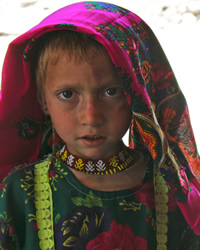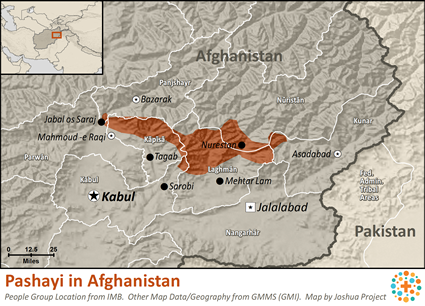The Northwest Pashayi, also called the Laurowan, Pashai, and Pasyayi, are of the Kashmiri people cluster. They live in Afghanistan, mostly in the valleys of the Hindu Kush in northeastern Afghanistan. They tend to live in valleys located near major river systems. The Northwest Pashayi mostly live in the area between Gulbahar and Nuristan Provinces along the Alingar River, especially in the Alisheng Valley and the valleys that are north of Sarobi. It is believed that the Pashayi once inhabited the northeastern plains of Afghanistan; however, they were forced to move to the mountains as the Pashtun invaded their areas. Very few people actually refer to themselves as Pashayi, rather they call themselves Safi, Kohistanis, or Nuristanis. Pashayi, a Dardic language, is their primary language and has many dialects. The northwestern Pashayi speak the northwestern dialect of Pashayi, which is unintelligible to other Pashayi speakers. The literacy rate for their first language is less than one percent and the literacy rate for their second language is between five and fifteen percent.
The Pashayi are mostly rice farmers, for those living at lower elevations, and wheat and maize farmers and herders, for those living at the higher elevations. Pashayi are tribal people. They are often led by a village council which is the authority on issues affecting the entire village. The council is composed of extended family members from each family unit. Personal disputes are left to be resolved by the individual who was hurt in some way, which often leads to feuds. The Pashayi value masculinity and honor more than anything else. To them the ideal man is one who is a proud warrior, loyal to his family, dangerous to his enemies, and always prepared to deal with a feud. Every Pashayi man carries a knife or a gun. The Pashayi culture has a rich tradition of songs and folklore which is passed down by oral tradition. Songs are often sung about their culture and traditionally, around harvest time, the young people in the village travel to other villages to sing the songs they'd composed throughout the year.
The Pashayi converted to Islam in the late sixteenth century. They are Sunni Muslims. Many Pashayi have some Folk Islamic practices, and it is not uncommon for Pashayi men to leave their communities to study under Pakistani or Afghani holy men. There are shrines dedicated to saints throughout their areas. There are few, if any, known believers or churches among them. There are Christian audio recordings in this language.
The Northwest Pashayi people need to submit to Jesus Christ so they can experience the abundant life He offers them in John 10:10.
Pray that the Northwest Pashayi people will have a spiritual hunger that will open their hearts to the King of kings. Pray for workers who are driven by the love and boldness of the Holy Spirit to go to them. Pray for a Disciple Making Movement among them to begin this decade.
Scripture Prayers for the Pashayi, Northwest in Afghanistan.
| Profile Source: Joshua Project |

























